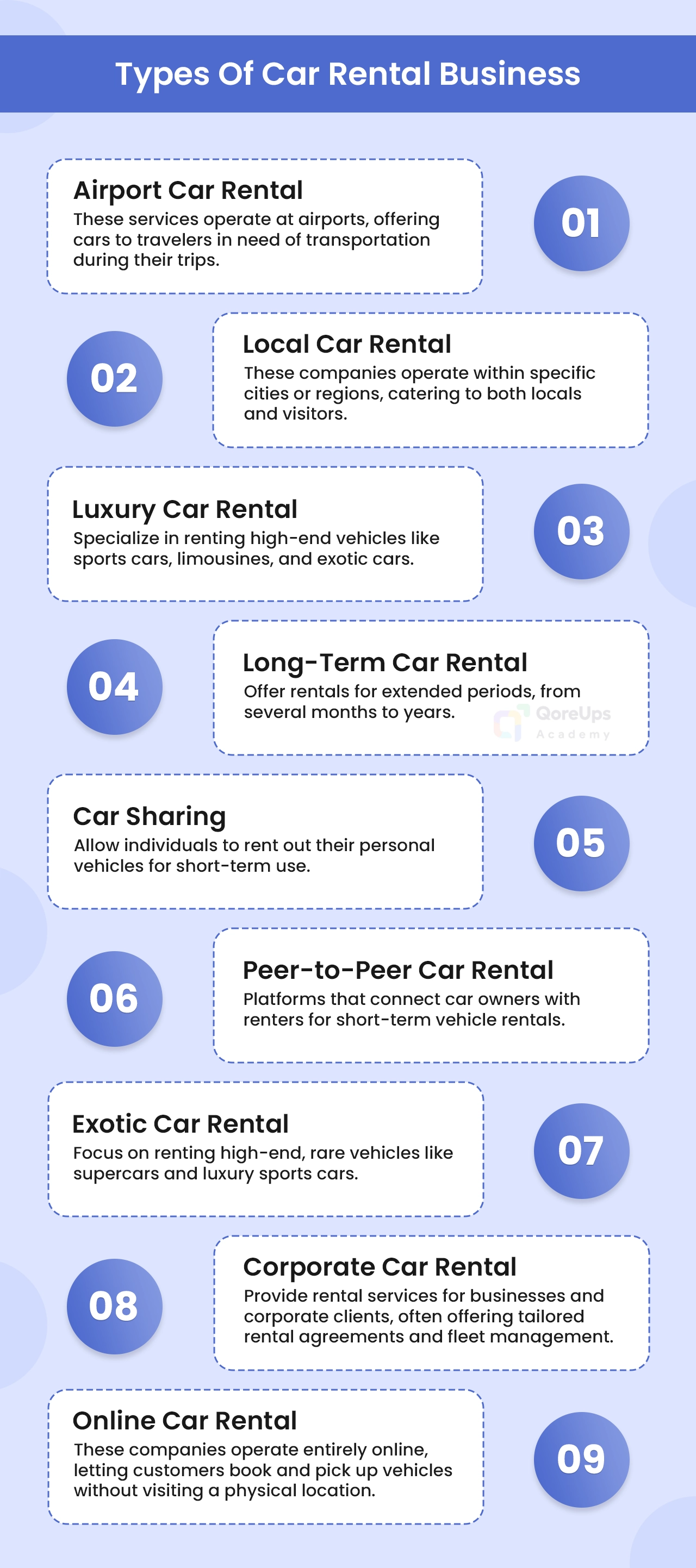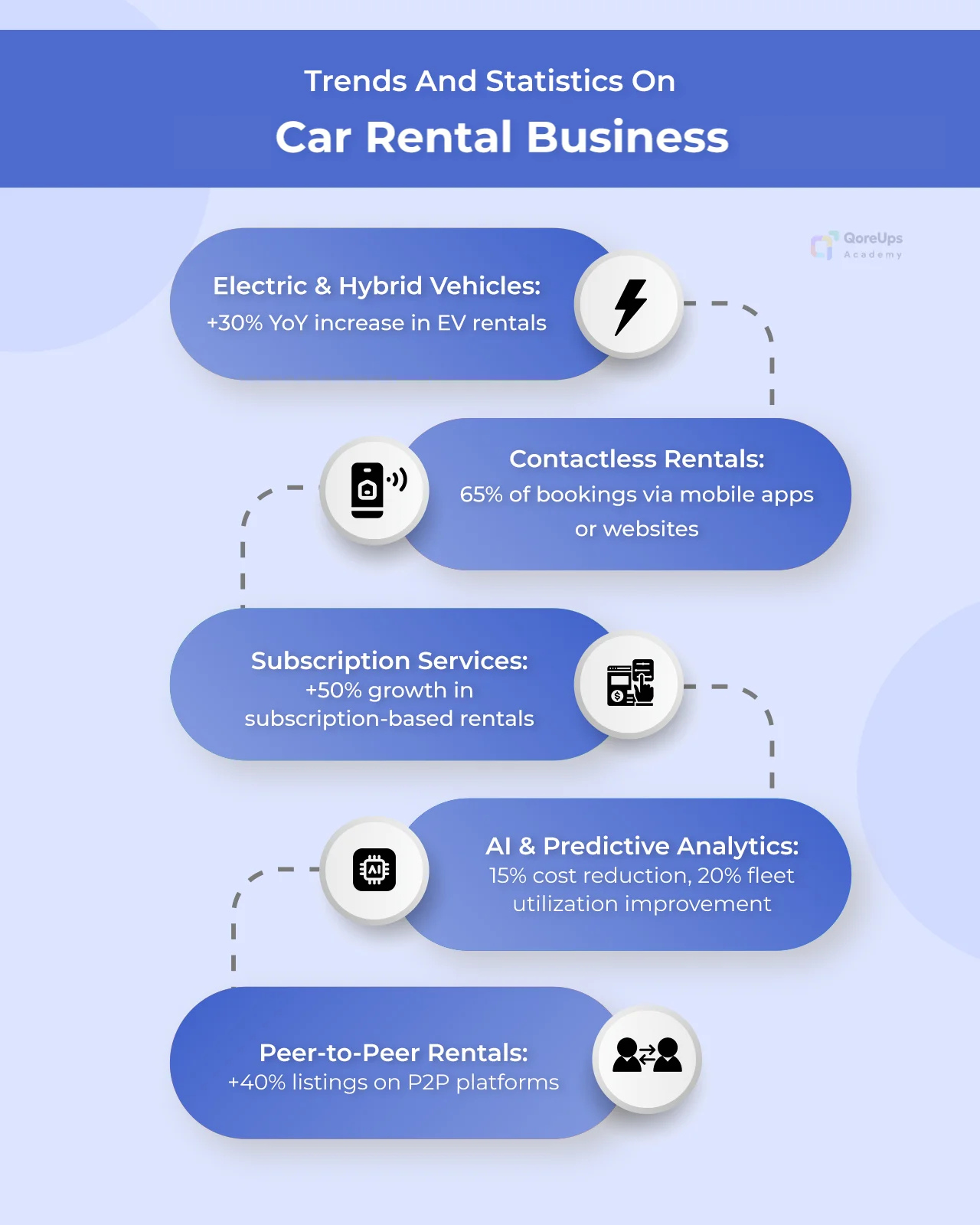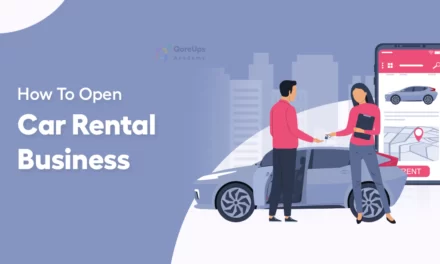Welcome to a new chapter of the marketplace, “The Rentals.” In this chapter, I’ll discuss everything you need to know about the start a car rental business.
Moving on to the chapter…..
The car rental industry has gained significant attention in recent years, leading to increased interest from entrepreneurs who are eager to start a car rental business.
In the United States, Canada, and Europe, renting a car is a highly favored form of shared mobility.
Recent statistics indicate that North America was the leading region in the global car rental market, with a market share of over 37% prior to the pandemic.
The Middle East and Africa are experiencing an above-average growth rate in the car rental industry.
If you’re an entrepreneur looking to start a car rental business in these regions or globally, this chapter is especially for you.
This chapter provides a comprehensive guide on how to start a car rental business successfully.
Before diving into the venture, it’s crucial to have a clear understanding of certain factors like,
What Is a Car Rental Business?
A car rental business is a type of service industry where a company or individual rents out vehicles to customers for a specified period for a fee.
Car rental companies typically maintain a fleet of vehicles, ranging from economy cars to luxury vehicles, which customers can rent for a few hours, a day, a week, or longer.
Car rental businesses provide customers with the convenience of having access to a vehicle without the expense and commitment of owning one.
Travelers commonly use them, and people who need temporary transportation. At the same time, their own vehicle is being repaired, and those who require a specific type of vehicle for a special occasion or event.
Types Of Car Rental Business
There are several types of car rental businesses, each with its own unique business model and target market. Some of the most common types of car rentals are:

But in this chapter, we’ll discuss the online car rental business. Instead of thinking about how to start a car rental business, think about what I need to start a car rental business. But, before that, you need to know the recent statistical report on the car rental industry.
Trends And Statistics On Car Rental Business – 2025
- Rise of Electric and Hybrid Vehicles:
- Statistic: Electric vehicle (EV) rentals have increased by 30% year-over-year.
- Trend: Growing environmental consciousness among consumers has led to a significant rise in demand for electric and hybrid vehicles in rental fleets. This trend is driven by both regulatory pressures and consumer preferences for sustainable transportation options.
- Contactless Rentals:
- Statistic: 65% of car rental bookings are made through mobile apps or websites.
- Trend: Contactless rentals have become the norm post-pandemic, offering convenience and safety to customers. Mobile apps allow for seamless booking, payment, and keyless entry to vehicles, reducing physical contact and enhancing customer experience.
- Subscription-Based Services:
- Statistic: Subscription-based car rental services have grown by 50% in the past two years.
- Trend: Consumers are increasingly opting for subscription models that offer flexibility, allowing them to use vehicles without the commitment of ownership. This trend appeals particularly to urban dwellers and frequent travelers looking for hassle-free mobility solutions.
- AI and Predictive Analytics:
- Statistic: AI-powered platforms have reduced operational costs by 15% and improved fleet utilization rates by 20%.
- Trend: Artificial intelligence and predictive analytics are transforming the car rental industry by optimizing fleet management, predicting demand patterns, and personalizing customer experiences. AI-driven platforms enable companies to forecast maintenance needs, pricing strategies, and customer preferences more accurately.
- Expansion of Peer-to-Peer (P2P) Rentals:
- Statistic: There is a 40% increase in global listing in P2P rental platforms.
- Trend: Peer-to-peer car rental platforms continue to gain popularity, allowing individuals to rent out their vehicles to others. This trend offers a wider selection of vehicles and competitive pricing compared to traditional rental companies, appealing to budget-conscious travelers and those seeking unique vehicle options.
These trends underscore the dynamic shifts in the online car rental business, driven by technological advancements, changing consumer behaviors, and a growing emphasis on sustainability and convenience.

What Do I Need To Start A Car Rental Business?
Starting a car rental business can be a complex process, but you need to consider some essential steps and requirements:
5 Step Process To Start A Car Rental Business
- Conduct Market Research: Research your target market to identify the demand for car rental services, the competition, and the most profitable car types and rental periods.
- Research Local Regulations: Check the local laws and regulations for starting a car rental business in your area. Secure all required licenses, permits, and insurance before proceeding.
- Design An Business Model Plan: This outlines your business goals, target market, competition, marketing strategy, financial projections, and startup costs.
- Choose A Car Rental Software: Select a reliable rental management software to help you manage reservations, bookings, payments, and other business operations.
- Launch And Market Your Business: Launch your business and market it through various channels, such as social media, etc. Build a loyal customer base through promotions and offering discounts to attract customers
Step 1: Conduct Market Research Before You Start A Car Rental Business
Market research is essential for businesses of all sizes, as it provides valuable insights and information about the market demand and the customers.
It helps in identifying market opportunities, understanding customer needs and preferences, evaluating the competition, reducing business risks, and improving marketing and sales strategies.
Conducting market research is critical for businesses. Because they need to stay competitive, understand their target audience, and make informed decisions that help them achieve their goals. The next step to market research is research on the local regulations and requirements for operating a car rental business.
To conduct market research for the car rental business follow the following
- Define The Scope Of Your Research: What specific questions do you want to answer? What type of car rental service are you interested in? Which location do you wish to start a car rental business?
- Identify Your Target Audience: Who you are trying to reach with your research? This might include the current or potential customers of the car rental business, industry experts, or other shareholders.
- Choose Your Research Methods: There are many ways to conduct your research. It includes surveys, focus groups, interviews, online reviews and ratings, social media analysis, and many more.
- Do Competition Analysis: How do different car rental companies compare in terms of price, vehicle selection, and other key factors? What are the major player’s strengths and weaknesses in the car market? Are there any companies that stand out as particularly competitive or innovative in the industry?
- Check Emerging Trends: How is the car rental industry evolving in response to changes in technology, transportation, and other trends? What new products or services are emerging, and how are car rental companies adapting to these changes?
- Collect And Analyze Data: Use your chosen research methods to collect data. And then analyze the data to draw conclusions and insights. You may need to use statistical analysis tools or other techniques to make sense of the data.
- Draw Conclusions And Make Recommendations: Based on your data analysis, draw conclusions about the car rental industry. Then make recommendations for how car rental companies can improve their services or better meet the needs of their customers.
Step 2: Research Local Regulations Before You Start A Car Rental Business
Researching local regulations for a car rental business is essential. Because this ensures compliance with the law and avoids penalties or legal issues.
- Identify the location where you plan to start a car rental business. Research the local government websites or contact the local government office to find out the regulations specific to your area.
- Check the requirements for obtaining a business license or permit to start a car rental business. This may include receiving a business license, a rental car operator’s license, or other permits.
- Check if there are any restrictions on where you can operate the rental car. Or how many rental cars you can have at any given time.
- Research the tax laws applicable to the car rental business. Find out if there are any taxes or fees associated with operating a rental car business. These can be sales tax, rental car tax, or airport concession fees.
- Check the regulations regarding liability and insurance requirements. Some regions may require you to carry additional insurance or meet specific liability standards.
- Understand the consumer protection laws applicable to the car rental business. Find out what is their need in terms of contract language, disclosure of fees, and dispute resolution.
By conducting thorough research on the local regulations and requirements to start a car rental business, you can ensure compliance with the law and avoid any legal issues in the future.
It’s always a good idea to consult with a lawyer or a local business advisor. This way you can ensure you are meeting all the requirements.
After concluding the research its time to design a business model.
Step 3: Design A Business Model
Designing a business model is a critical step to start a car rental business and run them as a successful business.
Because it provides a framework for decision-making, alignment, scalability, efficiency, and differentiation, all of which are important factors in achieving long-term success.
The top reason why you need to design a business model is,
- A well-designed business model provides clarity. This includes how a business will generate revenue, who its customers are, and how it will operate. This clarity helps business owners make informed decisions and create a roadmap for their company.
- A business model helps align all the different elements of a business. From customer segments to revenue streams, they work together towards a common goal.
- A scalable business model can adapt and expand as the business grows, making it a crucial element of success. This allows the business to take advantage of new opportunities and adapt to changing market conditions.
- A well-designed business model can help a company operate more efficiently, reducing costs and improving profitability.
- A unique and effective business model can help a company stand out in a crowded market. Also, can differentiate itself from competitors.

This business model canvas outlines your online car rental business plan. Once you have designed your business model, select a car rental software to execute your business model canvas.
Step 4: Choose A Car Rental Software
Choosing the right car rental software can be a crucial decision for a car rental business. When choosing a car rental software some factors to consider are:
Apart from these, you need to consider the following feature which is a must for a car rental business.
Features For Renters:
Easy-To-Use Booking Process. Renters should be able to easily search and filter available cars, select rental dates, and complete the booking process.
Flexible Payment Options. The platform should offer multiple payment options for renters, such as credit/debit cards, PayPal, Stripe, Razorpay, or other digital wallets.
Secure Transactions: The marketplace should have built-in security features to ensure secure transactions and protect sensitive personal information.
Insurance Options. The platform should provide rentees with optional insurance coverage. In order to protect them in case of accidents or damages to the rental car.
Reviews And Ratings. Renters should be able to view reviews and ratings of car owners to make informed decisions about which cars to rent.
Features For Car Owners:
Listing Management: Car owners should be able to easily create and manage their car listings, including details, availability, and pricing.
Booking Management. The platform should provide car owners with tools to manage their bookings, including accepting or declining requests and coordinating pickup and drop-off logistics with the renters.
Payment Processing: The platform should provide secure and convenient payment processing for car owners, with payouts processed promptly.
Features For Website Owner:
User Management. The platform should provide tools to manage user accounts, including registration, login, and account verification.
Revenue Management. The website owner should be able to track revenue, manage commission fees, and handle refunds or disputes.
Analytics And Reporting. The platform should provide real-time analytics and reporting to track important metrics such as rental rates, revenue, and user feedback.
Marketing Tools. The website owner should be able to create and manage marketing strategies to attract new users and promote the platform. They should include the tools like google analytics, google search console, etc.,
Customer Support: The platform should offer responsive and reliable customer support, including training, technical support, and troubleshooting assistance for users.
After selecting the car rental software, start building the car rental marketplace. First, you need to build an online car rental marketplace MVP. This helps you reach your audience quickly and also it provides a chance to improve your business.

Step 5: Launch And Market Your Business
Launching and marketing a business is a crucial step in achieving success. To successfully launch and market your car rental business follow these steps:
- Develop a plan that outlines your launch strategy, goals, timelines, and budget. This should include tactics for reaching your target market, such as social media, email marketing, or advertising.
- Develop a strong brand that resonates with your target market. This includes a memorable name, logo, tagline, and brand messaging that speaks to the needs. Also, the desires of your target audience.
- Create buzz around your launch by sending out press releases, hosting launch events, and reaching out to bloggers and influencers in your industry.
- Encourage your initial customers to refer others to your business through word-of-mouth and referral programs.
- Consider investing in paid advertising channels like Google Ads, Facebook Ads, or Instagram Ads to reach your target market more quickly.
- Track the success of your launch and marketing efforts, and adjust your strategy as needed to improve results.
Launching and marketing a business takes time, effort, and investment, but can be highly rewarding when done well.
By following these steps and continuously learning and improving, you can build a successful car rental business that reaches and exceeds your goals.

Is Owning A Car Rental Business Profitable?
A car rental business turns to be profitable with the right location, market conditions, and management metrics.
However, it requires substantial initial investment and ongoing operational costs.
An In-Depth market analysis and a well-crafted business plan are essential for success.
Location
- Tourist and Business Hubs: Being situated in areas with high tourist traffic or significant business activity can lead to higher demand for car rentals.
- Accessibility: Proximity to airports, train stations, and major hotels enhances convenience for customers, driving up rentals.
Fleet Management
- Vehicle Acquisition: Efficiently acquiring and managing a diverse fleet to cater to different customer needs.
- Maintenance: Regular maintenance to ensure vehicles are in good condition, minimizing downtime and repair costs.
- Depreciation Management: Understanding and managing the depreciation of vehicles to maintain profitability.
Customer Service
- Quality Service: Excellent customer service is the key option to ensure customer satisfaction and business quality.
- Ease of Booking: Implementing a user-friendly reservation system, both online and offline, to facilitate easy bookings.
- Additional Services: Offering add-ons like GPS, insurance, and child seats to enhance customer experience and increase revenue.
Marketing and Branding
- Effective Marketing: Utilizing various marketing strategies to attract customers, such as online advertising, partnerships with travel agencies, and promotions.
- Brand Reputation: Building a strong brand reputation through reliable service and positive customer reviews.
Cost Management
- Operational Costs: Keeping operational costs in check, including staff salaries, insurance, and utilities.
- Dynamic Pricing: Implementing dynamic pricing strategies to optimize rental rates based on demand and competition.
- Efficient Processes: Streamlining processes to reduce costs and improve efficiency, such as adopting technology for fleet management and customer service.
Focusing on these five factors can significantly enhance the profitability of a car rental business by attracting more customers, maximizing revenue, and minimizing costs.
Challenges Faced By The Owners Of Car Rental Companies
Competition
To start a car rental business and stay ahead of the competition, owners can differentiate their offerings by providing unique value propositions such as specialized vehicles, better pricing, or additional services like roadside assistance, or insurance.
Technology
Owners can stay ahead of the technology curve by investing in mobile responsive website design, and user experience. This involves keeping up with emerging technologies like blockchain, artificial intelligence, and predictive analytics to enhance operations, improve customer experience, and gain a competitive edge.
Trust and Safety
Owners can build trust with customers by providing detailed vehicle information, reviews, and ratings. They can also use identity verification to screen customers and ensure their safety. Implementing robust cybersecurity measures can also protect customers’ data from cyber threats.
Regulations
Owners can comply with local regulations by familiarizing themselves with local laws and regulations and working with local authorities to obtain the necessary permits and licenses. They can also purchase the required insurance coverage to protect themselves and their customers from potential liabilities.
Fleet Management
Owners can implement an efficient fleet management system that includes regular maintenance, repairs, and replacement of vehicles. They can also optimize their fleet utilization by tracking demand and seasonal fluctuations to maximize their revenue.
Marketing and Customer Acquisition
Owners can invest in effective marketing strategies like social media, search engine optimization, paid advertising, and referral programs to attract new customers. They can also leverage data analytics to target their marketing efforts to the right audience.
Customer Service
Owners can provide excellent customer service by responding promptly to inquiries, complaints, and issues. They can also implement a customer feedback system to identify areas for improvement and address customer concerns. When you start a car rental business you must plan to provide 24/7 customer service support. This enhances the customer experience and builds loyalty

The Future Of Car Rental Business
The car rental business is poised for significant transformation driven by technological advancements, changing customer preferences, and sustainability initiatives.
Companies that adapt to these trends by embracing innovation, enhancing customer experience, and committing to sustainability will likely thrive in the evolving landscape.
Technological Integration
- Mobile Apps and Online Platforms: Increasing reliance on mobile apps and online platforms for booking and managing rentals. Customers prefer the convenience of digital solutions for reservations, payments, and customer support.
- Connected Cars: Integration of Internet of Things (IoT) technology in rental cars to provide features like real-time tracking, maintenance alerts, and enhanced security.
Electric Vehicles (EVs)
- Growing EV Fleet: Car rental companies are increasingly adding electric vehicles to their fleets to meet the rising demand for eco-friendly options and comply with stricter environmental regulations.
- Charging Infrastructure: The expansion of charging infrastructure is critical for supporting the growing EV fleet. Rental companies may invest in charging stations or partner with existing networks.
Shared Mobility and Subscription Services
- Car Sharing: Online mode of car-sharing services serve as a better alternative to traditional rentals. Companies like Zipcar and Turo offer flexible, short-term rentals that cater to urban users who need a vehicle for only a few hours.
- Subscription Models: Paying a monthly fee to access various vehicles on a monthly basis constitutes this subscription model. This model provides flexibility and caters to users who prefer not to own a car.
Autonomous Vehicles
- Self-Driving Cars: The development and deployment of autonomous vehicles could revolutionize the car rental industry. Self-driving rental cars could enhance convenience, reduce costs associated with drivers, and attract tech-savvy customers.
- Regulatory and Safety Considerations: Widespread adoption will depend on regulatory approval and ensuring safety standards are met.
Sustainability Initiatives
- Eco-Friendly Fleets: Increasing focus on sustainability, with rental companies adopting eco-friendly practices and promoting their green credentials.
- Carbon Offsetting Programs: Offering customers the option to offset the carbon footprint of their rentals by contributing to environmental projects.
Customer Experience Enhancement
- Personalization: Using data analytics to personalize the rental experience, offering tailored services and recommendations based on customer preferences and behaviors.
- Seamless Experience: Streamlining the rental process with features like keyless entry, remote check-in/check-out, and automated customer support.
Conclusion
In conclusion, starting a car rental business can be a lucrative venture if done properly. The key to success is to have a clear understanding of the market demand, a well-defined business plan, and a robust marketing strategy.
Before you start a car rental business, it is important to conduct thorough research, acquire the necessary licenses and permits, and secure adequate financing.
Additionally, investing in a diverse range of vehicles, offering excellent customer service, and implementing efficient operations and management systems can help ensure the success of the business in the long run.
As the saying goes, “A Big Business Starts Small” ~ Richard Branson.
Starting a car rental business is vast. So, take a small step by launching a marketplace MVP before launching the marketplace business entirely.
Begin your car rental business!






